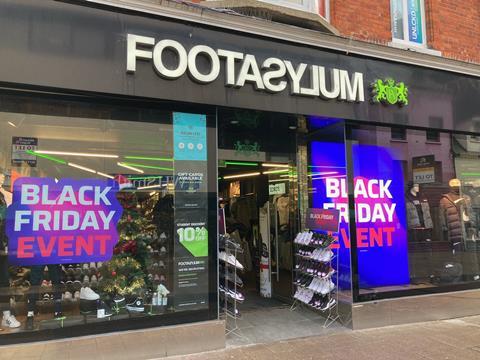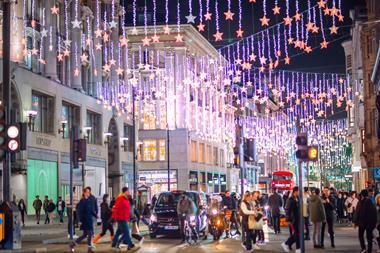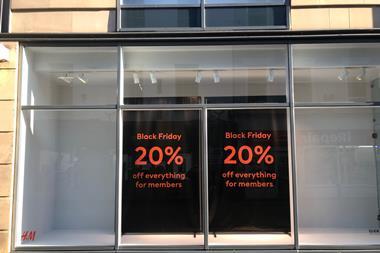PROMOTIONAL RESEARCH
In the wake of Black Friday 2021, Retail Week assesses the future impact on UK retailers of the various Mega-Sale-day events dominating the industry calendar.
John Lewis said it sold 286 items every minute online between 9am and 10am on Black Friday 2021, while Currys reported it serviced 56 online purchases every minute between Thursday November 25 and Black Friday morning.

Boots managing director Sebastian James tweeted that over half a million orders were taken on Boots.com over Black Friday weekend, with the health and beauty retailer achieving ecommerce sales rates of more than three products a second at one stage.
On the face of those statistics alone it would seem the Mega-Sale-day (MSD) event was alive and kicking in 2021.
For some retailers it certainly was, but the picture is mixed when aggregated sales and footfall activity is taken into account.
Springboard footfall data shows Black Friday shopper numbers were up across all retail locations on a week-on-week basis, albeit traffic remained well below pre-pandemic levels – down 24% overall on Black Friday morning compared with two years ago.
Online sales rationalisation is also taking place following last year’s ecommerce acceleration amid store closures due to Covid.
The shape and feel of Black Friday continues to evolve, with it clearly no longer just a single-day event
Preliminary data from IMRG shows the day of Black Friday itself saw online sales drop by about 14% on 2020, but average basket rates were up by £4 to £119 and conversion rates were stable at 5.3%.
Indeed, the shape and feel of Black Friday continues to evolve, with it clearly no longer just a single-day event.
“November you can definitely call a discounting month,” says Andy Mulcahy, strategy and insights director at IMRG, which has data showing a greater number of live online discounts on retail websites in the weeks leading up to Black Friday versus 2019.

Retailers and brands therefore need to highlight their Black Friday credentials in advance and deploy customer acquisition tactics throughout November, according to Nicolas Rieul, managing director for Western Europe at Criteo.
“Consumers are starting to search an average of ten days before and they go back [to purchase] on D-Day,” he explains.
“If you’re not on the list of retailers consumers are searching for you will not succeed on Black Friday or other MSDs.”
Criteo data shows the categories particularly in demand in 2021 were different from the gadgets and tech Black Friday was originally built on.
Criteo compares Black Friday sales to the average sales experienced in the first week of November to highlight how the MSD attracts spending.
The category driving the surge this year was jewellery, which using the above comparisons increased by 405%. Home & lifestyle and apparel jumped by 378% and 254% respectively, well ahead of the 128% spike experienced by consumer electronics.
MSD events around the globe
The idea of the MSD event extending to multiple days is also true of the 11.11 (11 November) Singles’ Day driven by China’s Alibaba Group and Amazon Prime Day, which typically takes place in June but is used by several non-Amazon retailers as an opportunity to provide discounts to their customers over a multi-day period.
David Lloyd, general manager for the UK, Netherlands and Nordics at Alibaba Group, says last year 250,000 brands were involved in Singles’ Day, but this year it grew to 290,000.
At its peak last year, Alibaba was processing between 500,000 and 600,000 orders a second
“It’s gone from this idea, through to being a pretty big day, through to last year when 11.11 turned into an 11-day festival,” he explains.
“There was so much consumer interest and so much brand interest that we actually had to create a bit more space for the shopping festival because trying to condense 290,000 brands into one 24-hour shopping period is pretty tough.”
He says at its peak last year, Alibaba was processing between 500,000 and 600,000 orders a second.
The success of this China-based event and its influence on peak-period shopping in other parts of the world is often used as an example of the perceived shift in global commerce power from west to east.
Daniel Lucht, research director at retail analyst group Research Farm, says: “A lot of analysts love telling stories about China and that the future of retail – and perhaps much else – is foreshadowed there.

“I reckon this is largely untrue, but the Singles’ Day event is clearly an innovation that has gone global – Amazon has copied it with its Prime Day. Arguably you need to have Amazon’s global scale and capabilities to pull off something like this.”
Another way of looking at it is that the success of Singles’ Day has unlocked opportunities for UK brands in China.
“Since I’ve joined the company, we are now working with well over 1,500 British businesses that have launched on [Alibaba’s online marketplace] Tmall,” says Lloyd.
“Last year on 11.11, those businesses made in the region of $496m during the festival.”
He lists Dyson, Burberry, Smooth Skin, The Body Shop, Charlotte Tilbury, Whittard of Chelsea, Teapigs, and Femfresh as UK brands that did well on Tmall in 2020.
An aura of excitement
Julian Grindey, a retail and digital specialist at Prof Consulting Group with 20 years’ experience as a global buying and trading director at Aldi, Studio Retail and AS Watson, advises developing “a clear purpose” when entering MSD events.
They present an opportunity to acquire customers and attract consumers from competitors, he notes, adding that retailers could think about their involvement as maintaining “share of voice”, clearing terminal stock, or tackling product underperformance.
“These events have created an aura of excitement for customers worldwide,” Grindey adds. “This is a great opportunity to sell when customers are motivated and ready to spend.”
He continues: “But the bargains must be genuine. Fake bargains are for foolish short-term retailers and customers are incredibly savvy.”
“This is a great opportunity to sell when customers are motivated and ready to spend, but the bargains must be genuine. Fake bargains are for foolish short-term retailers and customers are incredibly savvy”
Julian Grindey, retail and digital specialist at Prof Consulting Group
Retailers need to adopt their own approach to MSDs, while companies such as Next and – until recently – Asda have opted out entirely.
Lucht notes: “My answer as to who should get involved wouldn’t be so much about the broader sub-sector but the individual retailer.
“Moreover, if a retailer is relatively new or has innovative product ranges, sales events are a good idea to convince shoppers to try them out.”
Regardless of their impact on margins, MSDs have become an influential fixture on the calendar. As Rieul says, they represent “a win-win” for consumers, who now expect discount activity from brands and can save significant money on high-value items.
MSDs have made the post-Christmas sales less relevant, according to the analysts Retail Week spoke to, bringing forward much of the purchasing activity that previously took place from Boxing Day and into January.
And with the launch of the Coresight Research-led 10.10 shopping festival in the US in 2020, which aims to stimulate festive shopping a month earlier than the 11:11 event, the rise in spending that accompanies peak period could be brought further forward still.
“If a retailer is relatively new or has innovative product ranges, sales events are a good idea to convince shoppers to try them out”
Daniel Lucht, research director at retail analyst group Research Farm
The 10.10 event – a partnership between research house Coresight, retailers, tech companies and others – is distinguishing itself though ensuring every purchase made provides an opportunity to donate to a participating charity.
There is evidently lots for modern retailers to consider, including increasingly stretched out peak shopping periods, emerging MSD events, and changes to shopping patterns across different categories.
“The typical end-of-Christmas sale is still very important, but has of course been impacted by Black Friday, Cyber Monday, etc – this is definitely a change to past shopping behaviour,” notes Lucht.
“As always, retailers which do not change the way they plan their calendar years, and carry on engaging with consumers in the way they always have done, will lose out to more nimble competitors.”
Watch on-demand: The future of the Mega-Sale-day event
Watch leading retail ecommerce directors as they discuss how to get ahead for Mega-Sale-day events in 2022 and drive sales velocity.

Mega-Sale-day events can be a bonanza for consumers and retailers. From Black Friday and Prime Day to Singles’ Day, the number of events is increasing. But are sales?
How will Mega-Sale-day events impact retail in 2022? Will trading periods be stretched even further? What can retailers do to get ahead? How can new strategies optimise sales?
To find out, watch our virtual panel discussion, The future of the Mega-Sale-day event, in partnership with Criteo.
Our expert panel features Heal’s Customer and Ecommerce Director David Kohn, former Schuh Director of Ecommerce and Customer Experience Sean McKee, and Criteo UK Account Strategist Sean Malkin.


























